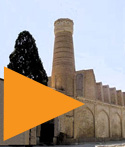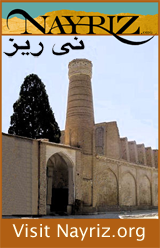
|

|
| Home | Prologue | Excerpts | Reviews | Sample Chapter | About the Authors | Contact Us |

|
|
Excerpts from Awakening
1
In the darkness of his stone cell in the remote fortress prison, the Báb wept for all those who had believed in Him, who had not let public humiliation and loss of their worldly positions stop them, and who had loved Him so much that they had submitted themselves to painful deaths in His Name. In the valley below, the villagers lit their home fires. Night and day Vahíd, formerly the most prestigious cleric in Persia whom the Báb had called one of the “two witnesses" of His Cause, rode on the horse the King of Persia had given him and taught from Khurasan to Loristan, from Isfahan to Ardistan, from Ardakan to Yazd, about the appearance of the Promised One and finally to Nayríz where he would offer a last sacrifice to the Báb—his life.
2
The next day passed without incident, but when darkness fell, Vahíd sent the Bábís into action. He told Ghulám Ridá-Yazdi, the commander who had been with him since Yazd, to lead fourteen men on a surprise attack. This group included a ninety year old shoemaker who was filled with excitement for the battle, and several very young men who had never participated in such action. Though wholly unsuited to fight real soldiers, they followed Ghulám Ridá-i-Yazdi out of the gate at midnight. They divided into two groups and quietly approached each side of the army camp. All of a sudden they bolted forward crying out “God is Great" and ran into the fray with swords unsheathed, swinging their blades. From the Chinár-Súkhtih quarter, other Bábís could see from the flash of the guns that a battle was underway. Hundreds of them rushed out to aid their fellow believers. The Bábi women climbed onto the roofs of their houses—which were near the battlefield—and cheered loudly, encouraging their men. Hearing the passionate cries of the women blending with the Bábí men’s repeated calls of “God is Great", the soldiers felt their courage abandon them. The Bábís kept up their assault and fought on through the night... ...the sun’s first rays fell upon a desolate army camp and an exhausted but victorious band of Bábís trudging back to the fort, carrying their wounded and dead. More than sixty Bábís and many more soldiers had perished in the nighttime battle. Some Bábís, after experiencing the fierce fighting, became frightened and left. The army, though, had been dealt such a blow that its commanders now knew they faced a powerful opponent.
3
Now that the fort had been emptied and the Bábís killed or dispersed, Zaynu’l-‘Ábidín Khán had to figure out how to get around his oath to Vahíd. He could not simply execute him because he had sworn an oath for his safety. But he wanted Vahíd dead, and the clergy of Shíráz had issued a fatwa for the execution of Vahíd and his principal companions. In their camp, in the open area known as ‘red mountain’ outside of Nayríz, Zaynu’l-‘Ábidín Khán and his advisors deliberated. One of the military commanders stepped forward to volunteer his services, saying he had not participated in the oath. He called on anyone whose family member had been harmed in the conflict with the Bábís to come forward and participate in punishing Vahíd. The brother of Mullá Báqir, who had carried a message for reinforcements but had been caught and killed by the Bábís, eagerly volunteered. He was followed by several others, including the governor’s nephew whose father had also been killed. Hungry for revenge, they walked up to Vahíd and yanked his turban—the sign of his lineage—off his head and wound it around his neck. Blows struck Vahíd one after the other, and he crumpled to the ground. They tied his turban to a horse and dragged him on the ground through the streets of town. The sight of Vahíd suffering excited the townspeople who crowded round and hurled insults, beat him with sticks and threw stones. Women danced around him. Somewhere in the frenzy, amid the exultation and the tumult, in the dust and the heat and the sweat of violent passion, and the shouting and the screaming reverberating on the mud-brick walls of Nayríz, Vahíd left this life.
4
Zaynu’l-’Ábidín Khán, the governor of Nayríz, eagerly rose to do his part in wiping out the Bábís of Persia. He would rid his city of these heretics who might overthrow him by allying themselves with his extended family, and then he could enrich himself by pillaging their properties. Many of the surviving Bábís had fled into the mountains where they hid in fear. Much of the Chinár-Súkhtih quarter—where most Bábís lived—was in ruins after the devastation that followed the fall of Fort Khájih. But a new resistance was forming. The governor received news that Bábís had attacked one of his grape syrup-making facilities on the mountain slopes, killing a few of his men. He heard rumors of plots. The numbers of Bábís in the Chinár-Súkhtih quarter seemed to be growing again. Afraid, he surrounded himself with a number of gunmen for security when he went out in public. He would have been much more nervous if he had known that, in the fall of 1852, a Bábí renowned for his extraordinary bravery had slipped back into Nayríz: ‘Alí Sardár.
5
Gurgling water could be heard in the nearby vineyard where many Bábís now hid. Mírzá Bábá’s soldiers nervously approached the vineyard; they knew there were Bábís there, and Bábís had a reputation for being fierce in their intensity and commitment. The soldiers surrounded the vineyard but only a few ventured in. Immediately a group of Bábís attacked with swords, sticks and stones, calling out, “God is great" and chased them out. The Bábí clerics and fighters, who were gathered in houses in town, heard the tumult, emerged from their locations, and ran hurriedly out towards the vineyard to join the fight. The Bábí fighting force was now much more formidable. The battle intensified. A lone sword-wielding Bábí dressed in white—a funerary color worn to show one’s readiness for death—rushed at the cavalrymen who were near the vineyard. They fled, the lone Bábí in pursuit. The chase went all the way to the governor’s mansion where the soldiers overcame and arrested their pursuer. Hundreds of shots were now being fired in the vineyard. The two hundred or so Bábís fought the soldiers who surrounded them on all four sides. Throughout the afternoon, the shooting continued, stopping only because of the darkness of night. Several Bábís, who had been taken prisoner when they were going towards the vineyard to aid their fellow believers, were brought back into town and thrown into a dungeon beneath the tower of the former governor’s mansion. Locked in and not knowing what fate awaited them, they thought of ways to escape. Soon, in the pitch black of the dungeon, the sound of knives could be heard, digging into the wall. The prisoners were attempting to make an opening through which they could crawl. But one prisoner, Khájih, betrayed the rest by letting the governor know about this escape attempt. He claimed that a mistake had been made, that he wasn’t a Bábí. The authorities told him that he would have to prove that he was not a Bábí by beheading the other prisoners.
6
No sound could be heard but the wind and the cry of a bird when the crackle of a rifle being discharged suddenly cut the silence, then buried it in a barrage of gunfire. The Istahbatani gunmen launched an attack, having been encouraged by their clerics who promised them salvation for wiping out these infidels. God’s good pleasure toward them would increase with every drop of Bábí blood. Five mullás from their ranks, though, went over to the Bábí side carrying weapons and ammunition. The attackers advanced quickly, capturing one makeshift defense after another until the Bábís had only a few positions left to defend. The two groups were now so close that if a mosquito buzzed on one side the other could have seen it. From his hiding place behind a boulder, an Istahbátáni sharpshooter lowered his rifle, squinted to focus on one of the Bábís, and pulled the trigger. The rifle spit the bullet through the air piercing the body of a Bábí who fell over. The sharpshooter focused and fired then fired again. Three Bábís collapsed on the mountain slope; again he fired and then one more time. Two more Bábís lay dying. He eased the trigger back again but, this time, it only clicked. Now, a Bábí was rushing over at him, and he could do nothing.
7
“God is Great" echoed in the darkened canyons as the Bábís leaped from their hiding places into the midst of the soldiers, who panicked and ran about, disoriented. A confusion of shouting, grunting, swords clashing and guns retorting could be seen suddenly when one of the soldiers’ yurts, a temporary dwelling, was put to the torch and then another and another and the light and heat grew more intense along with the passion of the hand to hand combat as each man struggled to overcome the other. The Bábí women who had come out with their men to the mountains, stood on rock outcrops watching, throwing stones and ululating encouragement. Now able to see the way out because of the light of the fires, the soldiers turned and ran in a jumble—with Mírzá Na’ím clinging to the back of one of his men—through the pass, the orange flames lighting their backs as they retreated. A large black cannon sat abandoned in the midst of the debris of the struggle. The Bábís took off its wheels and attached ropes to it. They dragged it up the slope. When they reached a cliff, men went to the top and together hoisted it up. The great black cannon was dragged up one end at a time, knocking on the rock face, ropes creaking and whining in the night wind.
8
One of the Bahárlú leaders stepped out from his hiding place and walked over to the scene of the carnage. When he recognized the face, he thought of the reward he might get, unsheathed his sword and brought it down with full force onto the corpse’s neck. He grabbed the severed head by its hair and ran towards Mírzá Na’ím’s camp. Arriving at the camp, he came in front of Mírzá Na’ím and raised the severed head. The Nayrízí guides who were accompanying the army, confirmed that this was indeed Sardár’s head. Extremely relieved to see his much feared opponent dead, Mírzá Na’ím covered the Bahárlú chieftain with a robe of honor—an overcoat made of fine fabrics—and coins. Now Mírzá Na’ím could sleep more easily, and the Bahárlú chieftain walked away a wealthier man. As night came, the Bábís up in Sardár’s fortification were greatly concerned. Suddenly they saw Siyyid ‘Alí—who had ridden out with Sardár earlier that day—stumbling and lurching towards them through the darkness. They ran to help him and, as they got closer, they saw the blood on his clothing from his many wounds. Barely able to speak, he told them of being shot at and pelted with stones. Then he uttered words which they couldn’t bear to hear— —the “bird of Sardár’s spirit has been released from the prison of self."
9
Once out of the mountains, they went towards the mill. A fourteen year old boy walked behind his mother with his hand tied to her waist. He asked why he was tied to her; she told him that if the soldiers took him and killed him, she wanted to be there so she wouldn’t spend the rest of her life wondering and waiting. She carried her other, much younger, son in her arms. Following her husband’s advice before he had been killed, she had put on her plainest, coarsest clothes in anticipation of being captured by soldiers. On her younger boy, though, she had accidentally left a hat with little ornaments on it. A cavalryman rode up, leaned down and snatched it off with such violence that her boy was thrown from her arms, his small body landing on the hard ground many feet from her. She ran to him in a panic and picked him up. He was unconscious, a bald spot on his head where his hair had been torn out by the violent grab. She cradled him in her arms, trying desperately to revive him, kneeling on the ground—enveloping his little body just like she had at his birth—when he stopped breathing.
10
The large Qashqa’i tribe, named after the Turkic language spoken by many of them, and made up of nomadic clans, drove their flocks across the province of Fárs to seasonal pasture lands when winter turned to summer and back again. Their colorful and highly prized rugs were sold in the markets of Shíráz, and their multi-colored clothing was easily recognizable in the countryside. Passing through the capitol of Fárs, Shíráz, they had become involved in the politics of the region. The tribal leaders worked with the Persian rulers in controlling and ruling the province. These included Lutf ‘Alí Khán, the Qashqa’i leader who served as a brigadier general for the Persians and had been hired to fight the Bábís in the mountains of Nayríz. With overwhelming numbers of men and several cannon, he had subdued them for his Persian overlords. He and his men camped with Mírzá Na’ím by the mill and conducted clean-up operations. They had beheaded all young male prisoners. Now he announced to his men that there would be a reward for anyone who brought him a Bábí, dead or alive; Qashqa’i fighters swept up the mountain paths with daggers and swords and rifles, looking behind boulders, slashing into groves, entering into dark caves, looking out from rock outcrops, climbing higher and higher ... A group of women, their children, and some men hid in the darkness of a cave and just hoped that they would be passed by. But they were found. Soldiers piled the entrance high with hay, twigs, branches, poured kerosene all over and lit it. Soon the opening of the cave was completely sealed by a wall of roaring fire which turned the mountain rock black and the inside of the cave into a smoke filled oven...
11
As night receded, the outline of shoulders, heads and backs of the prisoners emerged from the gloom. All around the stone yard and rooms of the caravanserai, the silent mass trembled. Feeble cries of infants rose up into the cold air only to give up and fall back down into the morass of exhaustion and hunger. Guards came into the yard and called the prisoners to attention. They lifted each other up against the protests of their weakened bodies. They were going to be led out of the madrisih to another location. Outside a mob had gathered. The Bábí women took their torn clothing and tried to cover their faces and arms as best they could—faces and arms that had never been seen by strangers—and as they came out of the caravanserai gate, feelings of shame engulfed them. Stepping into the street, they saw the faces of their fellow townspeople contorted in anger, their mouths shouting insults, baring teeth. A volley of small stones, dirt and spit showered the prisoners. They placed their arms over their children to shield them.
12
After some days they arrived at the last major town in Fárs province, Ábádih, an important stop on the migration route of the Qashqa’i tribe. Local people, urged by their clerics, came out to mock and heap abuse on the prisoners, assured that they would receive special blessings for doing so. The procession was met in Ábádih by a messenger from the court of the King of Persia who told them to leave the heads behind before continuing their journey to the capital. The local people refused to have the heads buried in their cemetery, for fear of its being desecrated by the remains of Bábís. So an abandoned field outside town was selected. Soldiers dug large pits and dumped the heads of the Bábís into them. As the Bábí prisoners were forced to resume their journey, they left this field in Ábádih behind them. This desolate field on the outskirts of Ábádih would remain untouched for ten years. Then, the One Whom God Shall make Manifest, promised by the Báb, would reveal Himself, new believers would settle in to Ábádih and a Bahá’í community would be born. Half a century after the heads of the Bábí martyrs had been buried, Bahá’ís stood in the presence of ‘Abdu’l-Bahá in the Holy Land, who asked them the name they had given this field. “Garden of the Martyrs’ Heads", they replied. ‘Abdu’l-Bahá stood up, and revealed a tablet of Visitation to be recited on his behalf by a believer: “Glory be upon you! Blessed are you for what you have done. You offered up your possessions, your kindred and your souls in the path of the Glory of God for the love of His Most Exalted Beauty. Praised be Thy Most Glorious Lord as He hath created you, and hath called you into being and hath raised you up from the tombs of self and desire and hath enlisted you under the banner of the Praise of God at the hour when the Most Great Resurrection came to pass." ‘Abdu’l-Bahá gave this place a new name; it would henceforth be called: “The Garden of the Merciful".
13
A few hours earlier, Pari Jan had left her hiding place to see what was happening. A neighbour saw her and came over in tears. Pari Jan asked why she was crying, and the neighbor told her she had just seen Pari Jan’s Father and husband killed. Pari Jan quickly put her six-month old son and five year old daughter back in the house and raced north up the street towards the bázár district where the killing had taken place. She ran into a very large crowd. They were watching something. She made her way forward and then saw the body of a man being dragged by his feet. It was her father. Her mother joined her. Other women, recognizing Pari Jan and her mother, told them that they had to go and hide or they too would be killed. Mother and daughter ran back to the Chinár-Súkhtih district and banged on several neighbors’ doors but even friends and neighbours were too frightened to let them in. Having nowhere to hide, they made their way south out of town and found a field with tall bushes. They pushed their way into them, but the owner of the field saw them crouched down and told them to leave. They came to a wall, climbed over it and fell into a large orchard. They remained there without making a sound. In the distance they could hear the mob screaming as her father’s body was being hung upside down. Looking up, they saw a man climbing over the wall. He was a friend. He jumped down and told them they could find shelter with him for the night.
14
With the casket resting on the bottom of the sarcophagus, ‘Abdu’l-Bahá took off his turban, his shoes, and his cloak and ... bent low over the still open sarcophagus, His silver hair waving about His head and His face transfigured and luminous, rested His forehead on the border of the wooden casket, and, sobbing aloud, wept with such a weeping that all those who were present wept with Him. That night He could not sleep, so over whelmed was He with emotion. Later, ‘Abdu’l Bahá wrote of this day: “The most joyful tidings is this, that the holy, the luminous body of the Báb ... after having for sixty years been transferred from place to place, by reason of the ascendancy of the enemy, and from fear of the malevolent, and having known neither rest nor tranquility has, through the mercy of the Abhá Beauty, been ceremoniously deposited, on the day of Naw-Rúz, within the sacred casket, in the exalted Shrine on Mt. Carmel ... By a strange coincidence, on that same day of Naw-Rúz, a cablegram was received from Chicago, announcing that the believers in each of the American centers had elected a delegate and sent to that city ... and definitely decided on the site of the Mashriqu’l-Askár." **** In Nayríz that night, a silvery figure made its way through the empty streets of the bázár. The mutilated corpse of Mullá Ḥasan had been left in a public square of the bazaar. The figure that made its way towards the body was Mullá Ḥasan’s Muslim friend from childhood, ‘Alí. This good friend picked up the body in his arms and carried it out of the square to the Aghel Khatib cemetery. There he dug a grave, carefully placed his friend’s body into it and covered it over with soil. **** In an old abandoned house outside of town, the women and children of Shaykh Muhammad Husayn’s family couldn’t fall asleep. They heard voices of people outside in the night looking for Bahá’ís. Mashadí Ḥasan, their guide, came in and told them that people were looking for Bahá’í men and boys over twelve and that there had been two martyrdoms of Bahá’í men earlier that day. The old house would not provide sufficient protection for them, he said, and he would return at dawn to bring them to some safe homes in town. Then he went back out into the night. Wide awake, the women and children huddled in the abandoned old house waiting for dawn.
15
In the depth of night, they lost their way again. They built a fire to ward off the cold which swirled around them. They sat around the large fire some gazing at it unable to sleep, some unconscious. Karbalá’í Muhammad Saleh felt the warmth of the flames. In the temporary rest this warmth gave him, he thought of the sacrifices made by his family. His mother Fátimih had become a believer immediately when Vahíd had proclaimed the Message of the Báb. He and his mother had been prisoners in Shíráz after the fall of Fort Khájih. He could see the faces of the many family members who had perished, and he remembered the desperate conditions in which they had lived for years after their return to Nayríz. Now he had been forced to leave his wife, Zohreh, and young son Amr’u’lláh. But he also felt the power and majesty of Bahá’u’lláh whom he met in Baghdad, and the greatness of the Cause for which his family had given so much—and he was consoled. As dawn broke, they forced themselves to their feet. After this rest, they felt the full physical pain of their abused feet, strained muscles, and lack of food. Silently, they moved forward. To keep moving, they picked leaves and wild bracken to eat. With less than three kilometers to go, some of the men could go no further and many just collapsed where they stood. Two of the younger men, who had more strength, hurried on to Sarvistán to get help. After some time, groups of people appeared coming towards them with mules and carriages. As these people came nearer the refugees saw them carrying supplies. These were the Bahá’ís of Sarvistán. |
فارسی |
中文 Español | Русский Français | Български Available Now! In USA 
In Canada (BDS) 
Book Review: Assoc. for Bahá'í Studies 
Encyclopædia Iranica Article 
Bahá'í Perspective Podcast 
Bahá'í Blog Interview 
What is Awakening? 
Hussein Ahdieh Reflects on Awakening 
   |
|